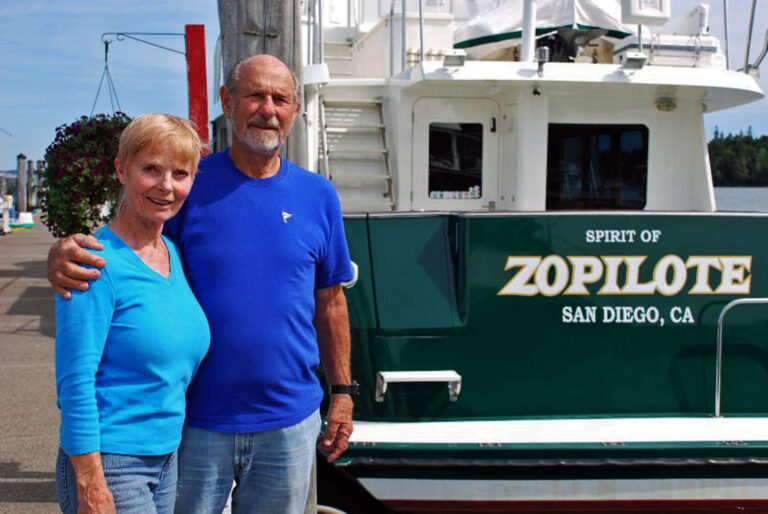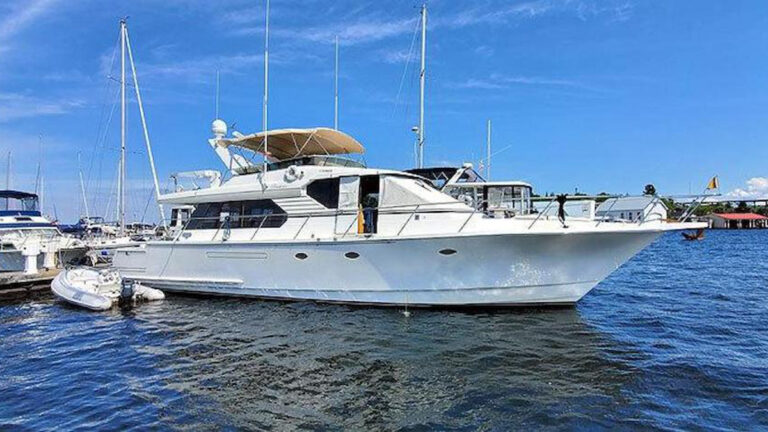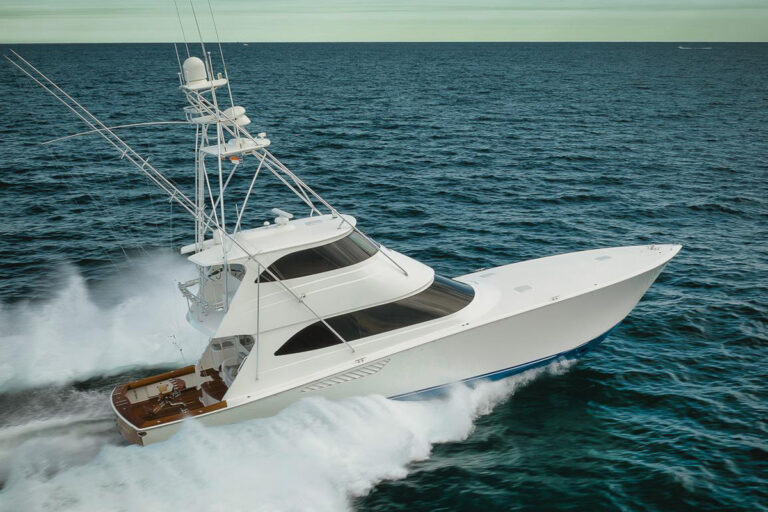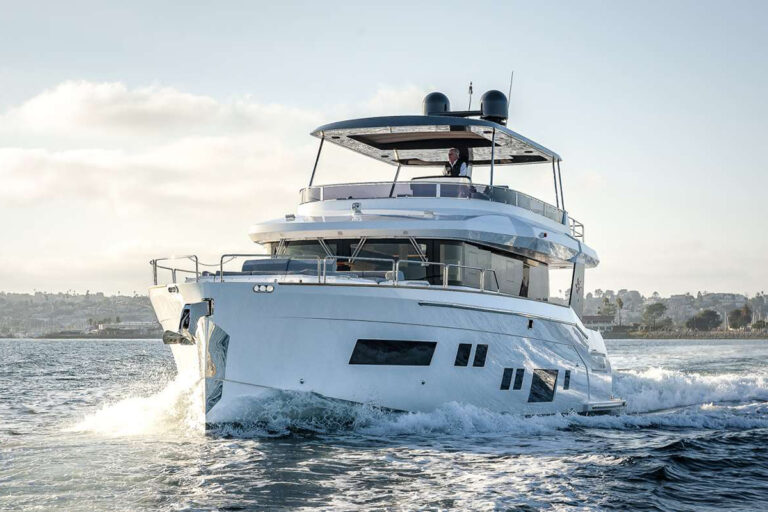
If the itinerary involves the high latitudes or the South Pacific, there’s no question that satellite connectivity is key for safety communications, weather routing and staying in touch. The dilemma, however, is what kind of satcom system to buy. This, of course, is largely dictated by one’s data habits, and anyone with insatiable streaming needs should opt for a radome-enclosed VSAT system. But, for anyone who just wants to (patiently) download GRIB files, send and receive low-bandwidth data, and make emergency and non-emergency phone calls, Lars Thrane’s new LT-3100S terminal, which operates on Iridium’s new Global Maritime Distress and Safety System (GMDSS) network, presents a cost-effective way of staying globally connected.
Some back story: GMDSS was established by the International Maritime Organization in 1979 to facilitate two-way emergency voice calls between stricken mariners and land-based Rescue Coordination Centers. Until recently, Inmarsat was the only GMDSS-network satellite-service provider the IMO recognized.
However this changed when the IMO added Iridium as a second official service provider. For cruising sailors, this recognition is poised to open the door to GMDSS innovations such as new hardware (terminals) and competitive rates for nonemergency calls. (See Iridium’s website for pricing.)
The LT-3100S is the first terminal designed to operate on Iridium’s GMDSS network, and it’s projected to become commercially available sometime this year, pending GMDSS certifications that were underway at the time of this writing.
“GMDSS [hardware] is highly regulated by the IMO and is well-defined,” says Wouter Deknopper, Iridium’s vice president and general manager of maritime. “Regardless of the [network] provider, GMDSS combines three important capabilities: distress alerts, maritime safety information and safety voice.”
Unlike higher-bandwidth satcom options such as VSAT and FleetBroadband services, the LT-3100S operates on L-Band (1-2 GHz) frequencies and provides fully global communications—but at significantly slower data-transfer speeds. The system uses Iridium’s Short Burst Data service to transmit small, low-bandwidth data packets (read: SMS, email, GRIB weather files and official maritime safety information)—not complete files—and it leverages Iridium’s GMDSS network to deliver a dedicated voice channel for making emergency and nonemergency voice calls. Also unlike VSAT or FBB systems, GMDSS prioritizes emergency communications over nonemergency transmissions
“The Iridium network has a ‘priority-and-preemption’ [scheme] where everyday calls get demoted by more important safety-of-life calls,” Deknopper explains, adding that while emergency calls are always free, users need an airtime subscription to send or receive data or make nonemergency voice calls.
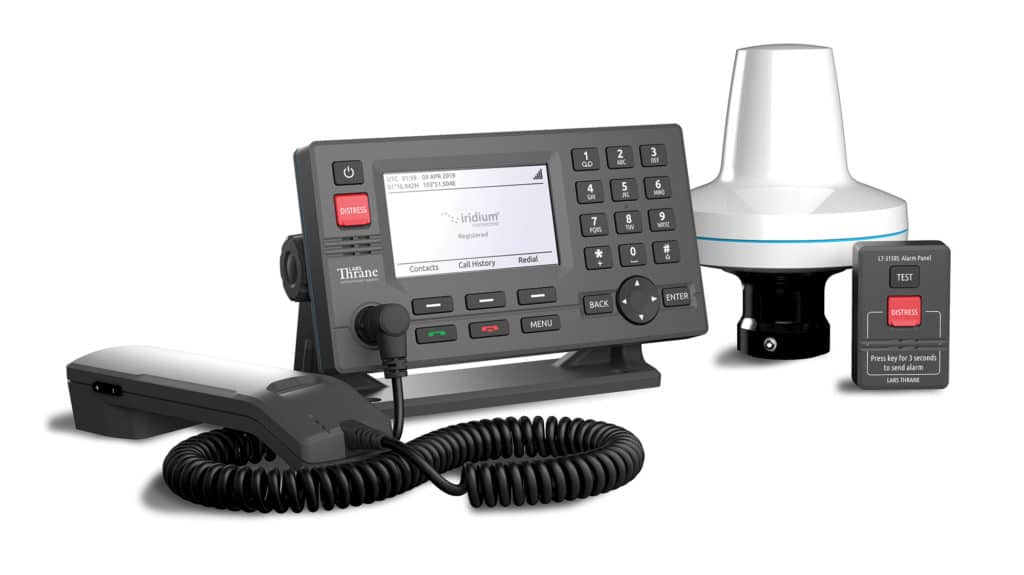
Physically, the LT-3100S consists of a handset, a soda‑can-size antenna and a Bluetooth-enabled control head with an embedded Global Navigation Satellite System receiver. Critically, it’s the first GMDSS terminal to offer full GMDSS capabilities, plus built-in voice (N.B., Inmarsat terminals require a separate module for voice communications), all in a sailboat-friendly form factor.
Should calamity strike, users press the terminal’s red emergency button, and the system immediately pings the closest RCC with an electronic satellite distress signal (including the vessel’s name and its germane navigational details) before automatically calling the RCC. In turn, the RCC notifies the proper rescuing authorities and all nearby GMDSS-equipped vessels.
“It’s a huge advantage to have emergency voice, as you can give the RCC your full details,” says Peter Thrane, Lars Thrane’s CEO, adding that an LT-3100S also allows users to receive emergency communications about other distressed vessels so that they can provide assistance.
Conveniently, the system is Bluetooth-enabled, allowing cruisers to use their familiar wireless devices for nonemergency GMDSS communications.
As previously mentioned, the LT-3100S operates on Iridium’s SBD service, meaning that uplink and downlink speeds will feel pedestrian compared with VSAT; however it’s important to remember that SMS, email, and voice calls merely sip bandwidth, while high-resolution images, video, software/firmware updates and vector-cartography downloads are the bandwidth gluttons.
“It’s primarily about safety,” Thrane says, adding that the terminal can send and receive data at 2.4 kilobits per second; with back-end compression, this rate can increase to 10 Kbps. For comparison, a 1-meter VSAT terminal can—dependent on network and contract—deliver uplink speeds of 512 Kbps and downlink speeds of 1 megabit per second; however, a radome of this size would be a tricky task to fit aboard anything shy of a 60-footer.
“You can make [nonemergency] calls at affordable prices, and it’s good enough for downloading email and GRIB files, but I wouldn’t surf the internet at these speeds,” Deknopper says, noting that dependable, fully global communications—not speed and bandwidth—are Iridium’s GMDSS strengths.
“It’s more about [obviating] latency,” he says, adding that Iridium users will enjoy the same voice quality, latency and data-transfer speeds globally.
Careful readers will remember that the LT-3100S sends and receives data as small packets, not complete files. Should communications be interrupted during download or upload by GMDSS’ priority-and-preemption scheme, the system economically resumes business where things went dark, rather than redownloading or resending the entire file.
So, while the LT-3100S (and Iridium’s GMDSS) won’t impress data-hungry grandkids with their speeds, the terminal’s ease-of-use and global reach make it a no-brainer alternative to single-sideband radios, and its pricing and safety features makes it a tempting alternative to satellite phones for sailors with still-respectable data habits.

